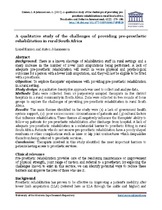| dc.contributor.author | Ennion, Liezel | |
| dc.contributor.author | Johannesson, Anton | |
| dc.date.accessioned | 2018-09-04T08:49:38Z | |
| dc.date.available | 2018-09-04T08:49:38Z | |
| dc.date.issued | 2017 | |
| dc.identifier.citation | Ennion, L. & Johannesson, A. (2017). A qualitative study of the challenges of providing preprosthetic rehabilitation in rural South Africa. Prosthetics and Orthotics International, 42(2): 179–186. | en_US |
| dc.identifier.issn | 0309-3646 | |
| dc.identifier.uri | http://dx.doi.org/10.1177/0309364617698520 | |
| dc.identifier.uri | http://hdl.handle.net/10566/4000 | |
| dc.description.abstract | BACKGROUND: There is a known shortage of rehabilitation staff in rural settings and a sharp increase in the number of lower limb amputations being performed. A lack of adequate pre-prosthetic rehabilitation will result in worse physical and psychological outcomes for a person with a lower limb amputation, and they will not be eligible to be fitted with a prosthesis.
OBJECTIVE: To explore therapists’ experiences with providing pre-prosthetic rehabilitation in a rural setting.
Study design: A qualitative descriptive approach was used to collect and analyse data.
METHODS: Data were collected from 17 purposively sampled therapists in five district hospitals in a rural community in South Africa. Data were collected in two rounds of focus groups to explore the challenges of providing pre-prosthetic rehabilitation in rural South Africa.
Results: The main themes identified in the study were (1) a lack of government health system support, (2) poor socioeconomic circumstances of patients and (3) cultural factors that influence rehabilitation. These themes all negatively influence the therapists’ ability to follow up patients for pre-prosthetic rehabilitation after discharge from hospital. A lack of adequate pre-prosthetic rehabilitation is a substantial barrier to prosthetic fitting in rural South Africa. Patients who do not receive pre-prosthetic rehabilitation have a poorly shaped residuum or other complications such as knee or hip joint contractures which disqualifies them from being referred to prosthetic services.
CONCLUSION: Therapists involved in this study identified the most important barriers to patients having access to prosthetic services. | en_US |
| dc.language.iso | en | en_US |
| dc.publisher | SAGE Publications | en_US |
| dc.rights | This is the author-version of the article published online at: http://dx.doi.org/10.1177/0309364617698520 | |
| dc.subject | Therapists | en_US |
| dc.subject | Rural | en_US |
| dc.subject | Prosthetic rehabilitation | en_US |
| dc.subject | Challenges | en_US |
| dc.title | A qualitative study of the challenges of providing pre-prosthetic rehabilitation in rural South Africa | en_US |
| dc.type | Article | en_US |
| dc.privacy.showsubmitter | FALSE | |
| dc.status.ispeerreviewed | TRUE | |
| dc.description.accreditation | ISI | |

